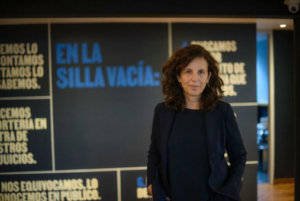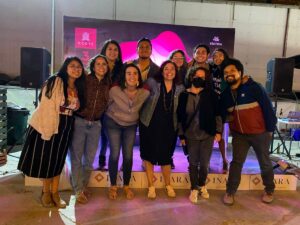*By Florencia Alcaraz
This article is an abridged version of the story originally published by SembraMedia.
"No soy mandona, soy la jefa", said a campaign that circulated a few years ago [in Latin America] as a translation of the English phrase "I'm not bossy. I'm the boss.” The slogan serves as a response to gender stereotypes that still haunt companies and organizations when the person in charge is a woman, a lesbian, a non-binary, or trans person. Although media companies in Latin America have not been able to get rid of these stigmas completely, the growing leadership of women in organizations in the region already presents lessons that serve to multiply a momentum that knows no fears or glass ceilings.
Sexist barriers, which question the suitability of women in positions of greater responsibility or hierarchy, are everywhere. The problem is much more serious when these obstacles are not only normalized in the work environment, but also affect the perception of women leaders or managers about themselves, their abilities and merit.
It is well known that this matrix of inequity runs through all industries, but what about digital media in the region? In Latin America, almost 38% of the founders of the 100 organizations consulted for SembraMedia’s Punto de Inflexión study in 2021 were women. We talked to several of them and this is what we found.

Carmen Riera with the RunRun.es team in Venezuela. (Photo: Courtesy SembraMedia)
Carmen Riera is Venezuelan, project manager at Runrun.es and member of the Editorial Board of TalCualdigital.com. Since 2020, she has been a mentor in SembraMedia's METIS program and has followed along with several young founders of digital news outlets. She defines herself as "a control tower that helps, accompanies and supports projects in their take-off, landing and flight."
One of the battles Riera undertakes with women leaders is to help them break with the impostor syndrome, a psychological phenomenon that produces in those who suffer from it the feeling that they are never up to the task, they doubt themselves or are unable to accept that they deserve what they have obtained as a result of their work.
It affects everyone, but it has a particular impact on women in managerial positions. For them, it translates into a lack of confidence, a sense of insecurity and the false belief that they are a fraud. "The struggle with impostor syndrome is from day to day," says Riera.
"When you lead an openly feminist news outlets, one of the main challenges is to be taken seriously in the journalistic field. In the Central American context — at least — there is a very strong discussion, a grievance against those of us women journalists who position ourselves as feminists," said Laura Aguirre, director of the feminist digital news outlet Alharaca of El Salvador and also part of the METIS mentoring team.

Laura Aguirre, director of Alharaca, from El Salvador. (Photo: Courtesy SembraMedia)
For her, within certain spaces of representation or leadership they are still required to choose between journalism and activism when women call themselves feminist journalists, and she identifies an operation built by their male colleagues who often stigmatize and degrade their work. "They take away any possibility of credibility, or of exercising the profession with rigor and truthfulness, because we’re activists. This implies that male colleagues who have influence within the ecosystem do not invite us to join networks of journalists, to be part of projects or activities."
From Puerto Rico, Cristina del Mar Quiles, founder of Revista Todas, agrees that there’s a structural barrier: "Undervaluing and devaluing our work is a challenge that persists and comes from long before we decide to found a news outlet. My female colleagues and I studied journalism. No one ever told us along the way that we could own our own news outlet and that we could decide how news would be told. It was [only] after seeing other experiences in the region that we saw it was possible.”
And she continues: “There are people who, despite what we’ve done, despite our contributions, do not take us seriously and prefer to continue privileging the supposed validation of hegemonic media in our country. It’s more difficult for us to carry out these projects because there are still people who believe that we do it as a hobby or as volunteers. Companies, foundations and people who could support us favor hegemonic communication styles that are sexist.”
This underestimation is not limited to visibly feminist media. From Guatemala, Alejandra Gutiérrez Valdizán, director and founder of Agencia Ocote, reflected on the issue: "There are challenges in terms of experience and knowledge that must be learned by leaps and bounds when it comes to directing a news outlet. There are not too many schools on media management and you have to develop your own tools and methods. This affects both women and men. However, (...) there is a generalized social perception in which a woman in management is not taken as seriously as a man."
Juanita León is the founder of La Silla Vacía, one of the pioneering digital news outlets in Latin America covering politics and power. When 'La Silla' was born in Colombia it was a novelty in the regional media ecosystem, and having a woman in charge was also part of its appeal. "It had the hook of women directors. I guess it made it less threatening to traditional media," said León, who is currently on the Sembramedia’s board of directors.

Juanita León, co-founder of Colombian digital news media La Silla Vacía (Photo: Courtesy SembraMedia)
For her, there is a before and after becoming a mother in her journey as a media leader. "The level of work is exponential. Even when men do their part when parenting and co-parenting, the first few years are very difficult and demanding," she said. She adds, “I felt like I was half as smart as I used to be. If it used to take me 15 minutes to edit a story, now it takes me two hours. That doesn't happen to guys. There's an extra mental load on us. There is a part of my brain that is always thinking about tasks related to caregiving.”
Feminist economics has made visible how caretaking is the hidden engine of the economy and falls mostly on people with feminized identities. Work means not only employment but also reproductive, domestic, caretaking, and community work. The asymmetry in the distribution of these tasks is one of the greatest sources of inequality between men, women and other identities: something that goes beyond the wage gap.
According to ECLAC, on average, in Latin America and the Caribbean, women devote twice as much time to domestic and caretaking work as men. This overload and the specificity of motherhood is a mandatory variable when thinking about the leadership of women, lesbians and trans people in the media ecosystem — they are juggling motherhood and leadership.

Part of the team at Revista Todas. (Photo: Courtesy SembraMedia)
Leading journalistic projects brings visibility on the Internet, a territory that can be very hostile. In recent years, online sexist violence has grown exponentially and the ways in which it manifests itself have multiplied. International agencies and human rights organizations have been carrying out work and reports on its dimension and the consequences on the lives of journalists, human rights defenders, activists, and politicians.
The regional study "Online gender-based violence against women with a public voice: Impact on freedom of expression" states that “women with influence on public opinion suffer persistent attacks that have negative impacts on freedom of expression, participation in public debate and, consequently, on the quality of a democracy (...) The consequences are personal (damage to mental health or risk or fear of losing their jobs are just a couple of examples), and social — those attacked withdraw from the conversation and public debate.”
For this research, conducted by the Regional Alliance for Free Expression and Information and UN Women, 15 in-depth interviews were conducted in which women reported gender bias in the violence they suffer on social media and the Internet. [They experience] greater cruelty and more disqualifications than their male colleagues and, fundamentally, [they receive] rape threats aimed at them and their children.
"The most frequent threat of physical harm is rape. It is the disciplinary action par excellence. Suffice it to say that the threat operates on the conviction that it is possible. Women know they are more likely to be — in fact — assaulted. All the women interviewed, to a greater or lesser degree, perceive this is a possibility beyond the virtual world," according to the report.
Another of the phrases that echoes in Carmen Riera's mind when she thinks of women media founders she has mentored during this time is: "I don't want to be called boss. I don't want to give orders.”
"When they get together and create collectives or work cooperatives, leadership as such does not exist. It is something shared, which makes things more difficult because there has to be someone who makes the final decision. Often, behind these more collective forms, there is a fear of leading like men. But leadership does not necessarily have to be the way men lead," Riera said.

Agencia Ocote team. (Photo: Courtesy SembraMedia)
The fear of reproducing authoritarian and patriarchal forms of leadership leads to rejection and, at the same time, it poses a challenge on the horizon for many — it’s possible to lead differently.
For Laura Aguirre, "a woman leader’s challenge is not to repeat traditional [power] dynamics within newsrooms. It is a question I ask myself every day: How to build newsrooms and teams that are free of violence, that are respectful, ethical, and have integrity not only facing out but facing in."
As to whether "feminist leadership" exists, she replies yes. "We must be open to making mistakes, to question oneself, to try things out and start over. It’s important to democratize communication processes, to open spaces for conversation, for conflict resolution. At Alharaca, we set up a bimonthly Q&A meeting between the coordinating board and the team of women reporters and designers. I try to sit down once a semester with each one of them to learn about their needs and expectations," she said.
Aguirre understands the need to recognize that hierarchies, organizational charts, structures, legal and financial responsibilities still exist, and that "they are not the same for those who lead as for the rest of the team. But other ways of leading can be found."
Cristina del Mar Quiles, from Todas, agrees: "It’s not easy because it requires unlearning authoritarian styles we learned in our previous work experiences and a discourse of excessive productivity that this society demands. Commitment and a feminist consciousness cannot be imposed on the whole team. But the leadership has to commit daily to leaving behind old styles and creating spaces of empathy and understanding, of recognition of privileges and oppressions, of collective self-care and struggle."
The process not only has to do with transforming leadership, but also "there’s a different logic of collaboration, of sharing knowledge, of conceiving competition," said Alejandra Gutiérrez Valdizán, of Agencia Ocote. "There is a generosity in women's leadership that translates into getting behind the leadership of women, lesbians, non-binary, and trans women in the same team. Even if it is due to quota logic, feminism provides us with an equal participation in order to have more diverse work spaces and newsrooms," she said.
--
This article was written originally in Spanish and was translated into English by Liliana Valenzuela.